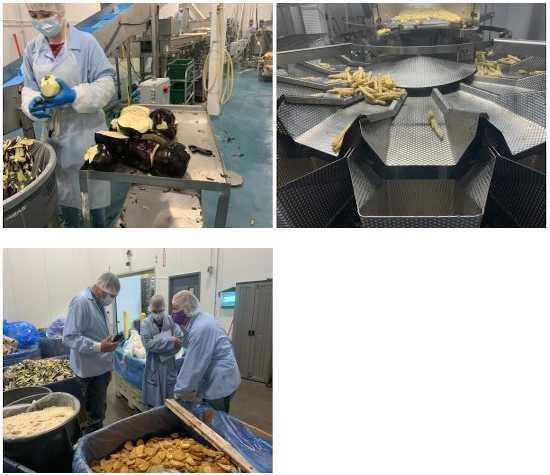By Wendy Mussoline
When Tom Hoversen, co-owner of Comarco Products, graciously welcomed me into his facility, I was simply overwhelmed with the scale of production. I thought to myself “I must be dreaming.” This absolutely impressive operation with three functional processing lines takes fresh eggplant and turns it into all sorts of fried creations – eggplant fries, eggplant cutlets, eggplant bacon – every Italian’s dream! Have you noticed my last name? This is some of the best eggplant parm I’ve ever had and there is no mess in my kitchen. But after the tour and glitter, it was time to get down to business. These folks have come all the way from Camden, NJ, to make themselves a nest here in Putnam County so it’s important to make them feel welcome. Our first order of business was to find them some local eggplant. Last December, there were no local growers in the Tri-County Agriculture Area that grew any substantial acreage. However, after we hosted another impressive tour for interested farmers, Wesley Wells seized the opportunity to grow 10 acres of eggplant for Comarco. There is still plenty of room for local farmers to partner with Comarco if they are interested in growing eggplant, but at least we’ve secured a local source. Comarco is a year-round facility that operates 24-7, so they need lots of eggplant – around 150,000 lbs per week and even more as their operation expands.

Coming from Jersey, they absolutely love the southern hospitality and warm welcome they’ve received from Putnam County residents. Tom is certainly a story-teller and he’s got some great one-liners that will keep you amused while you’re still amazed. I’ve never seen someone peel an entire eggplant in three seconds flat. The next order of business what finding a home for all these delicious eggplant peels. It was simply nonsensical to be paying to haul and dispose them in our local landfill. Residents generate enough real trash that needs to be buried in the landfill grave. Eggplant peels or fried eggplant that is a bit wonky should be supplemental nutrition for our extensive livestock community in Putnam County. So we collected both raw and fried eggplant and had the samples analyzed by Dairy one Forage Testing Laboratory in Ithaca, NY. Low and behold, this is some good eatin’ grub and if you watch this 50 second video you’ll see for yourself how much the cows love it https://www.youtube.com/watch?v=J2_sSqg-v_8.